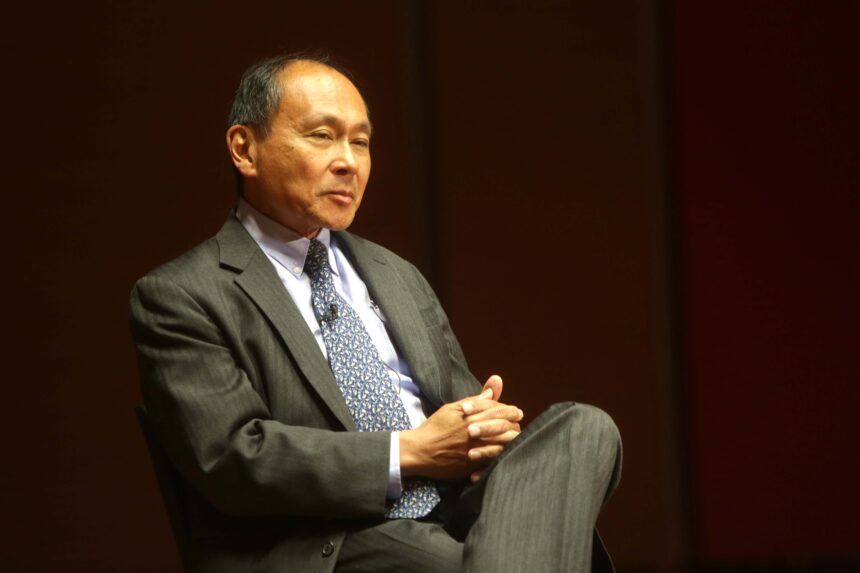
Liberalism and Its Discontents
by Francis Fukuyama
Farrar, Straus and Giroux
192 pp., $26.00
Believe it or not, 30 years have elapsed since Francis Fukuyama published The End of History and the Last Man. A work with far-reaching consequences for global politics, its central argument offered the American neoconservative movement and their allies on the political left intellectual rocket fuel. With the Soviet Union disintegrating, and communism completely discredited, Fukuyama argued that humanity was approaching “the end-point” of its “ideological evolution.” The universalization of liberal democracy and free-market capitalism was nigh.
The United States then launched disastrous projects to remake the world according to liberal principles. In the process, war profiteers amassed a fortune while Washington and its allies destabilized countries from Central Asia to North Africa. Even worse, the ensuing refugee crises rocked the stability of Europe.
Not surprisingly, Fukuyama has distanced himself from the consequences of his role in universalizing Western liberalism. If Western support for Ukraine backfires in the latest “struggle to defend liberal democracy,” one can assume Fukuyama will absolve himself of responsibility for that as well. He already regrets the Russo-Ukrainian War’s role in consolidating the Sino-Russian alliance. Indeed, Fukuyama is no longer prophesying the end of history.
Now his posture has become far more defensive. In his latest book, Liberalism and Its Discontents, Fukuyama reaffirms the “virtues” of liberalism and celebrates its core principles once again. Because liberal doctrine faces threats from abroad and from within Western societies, he hastens to remind readers of contemporary liberalism’s value and to analyze the nature, sources, and consequences of its discontents.
Fukuyama argues that, on the one hand, authoritarian right-wing populists endanger liberal institutions such as “courts and the justice system, nonpartisan state bureaucracies, [and] independent media.” On the other hand, left-wing populists embrace identity politics, which attack liberalism’s underlying premises like “universal human equality … and the value of free speech and scientific rationalism.”
Fukuyama opens the book with a definition of classical liberalism, which underscores claims common to all its variants: the primacy of the individual over the collectivity, the equal standing of citizens in the legal and political order, the universal appeal and applicability of liberalism’s core principles, and finally, a belief in the corrigibility of liberal institutions.
To the degree that liberalism faces a crisis, Fukuyama concedes that the fault partly resides in the shortcomings of the doctrine itself. However, it is the tendency to push some of its core principles to extremes, “to the point where those principles themselves were undermined,” that constitutes its biggest problem. No principle, he suggests, has been pushed to further extremes than liberalism’s “valorization and protection of individual autonomy.” Fukuyama explains this phenomenon with two chapters on neoliberalism and two on modern identity politics.
Neoliberals understand autonomy as “the right to buy and sell freely, without interference from the state.” Hence, they demand low taxes, deregulation, privatization, and free trade. These policies have resulted in economic growth, but the resulting wealth has consolidated in the hands of a fortunate few. Oligarchs in emerging economies amassed fortunes. Corporations offshored high-paying jobs to increase profits. Courts sided with multinationals in the destruction of mom-and-pop retailers. And investment banks collateralized worthless debts. In Fukuyama’s view, the resulting inequalities and financial instability unleashed populist reactions that now threaten liberalism.
Extreme variations of identity politics, he argues, have also harmed modern liberalism. Fukuyama suggests that feelings of victimhood and grievance have gone too far, leading both philosophers and activists to absolutize the concept of autonomy, expanding it in ways that undermine social cohesion, and even to attack core tenets of liberalism itself.
No work, Fukuyama argues, has had a greater impact on modern ideas of autonomy than John Rawls’ Theory of Justice, which denigrated “utilitarian versions of liberalism” to “defend individual choice” against “oppressive social control.” To illustrate Rawls’ point, Fukuyama elaborates with an example of a free-riding stoner who plays video games all day. According to Rawls’ theory, society should not deem this layabout any less worthy than the straight-A student who aspires to public service.
Why? Because Rawls’ conception of human dignity springs from one’s autonomy to choose and not from the nature of the choices one makes. Consequently, the straight-A student’s success is society’s common property. As such, the state can expropriate the fruits of his labors and distribute them to everyone, including the underserving stoner. Fukuyama abhors the implications of Rawls’ ideas, which, he also reminds us, dominate the academy and legal profession.
But what do Rawls’ ideas have to do with modern identity politics? Initially, Fukuyama writes, identity politics sought “to complete the liberal project, and achieve what was hoped to be a ‘color-blind’ society.” But with time, identitarians shifted their focus from “liberalism’s failure to live up to its own ideals, to a critique of liberal ideas in themselves.” Fukuyama explains that “liberalism’s emphasis on individualism, its claims of moral universality, and its relationship to capitalism” became the subject of attacks, primarily from critical theorists, many of whom denied that blacks, gays, and women could ever exercise the privilege of individual autonomy. This right, they concluded, could only be exercised by groups, as Rawls argued. In effect, the critical theorists replaced the stoner with a Black Lives Matter activist.
Many of these theorists also launched a critique of rationality, the focus of the book’s fifth chapter. This development, too, has fueled identity politics, although its origins go back to the 19th century. Observations of the Swiss linguist Ferdinand de Saussure inspired deconstructionists such as Roland Barthes and Jacques Derrida, as well as structuralists like Michel Foucault. Generally, these scholars argued that reality derives not from what we observe and sense—the essence of empiricism—but from language, which is a structural representation of reality susceptible to control and manipulation by elites. Therein resides the link to identity politics. According to many critical theorists, Western elites have always been white men with no interest in relinquishing their hold on power structures that oppress everyone else. Worse, these critical theorists deny the possibility that anyone can even understand the reality of a marginalized group to which they do not belong. The “lived experiences of different groups” are “fundamentally incommensurate” regardless of the empirical evidence.
To help the reader understand the implications of this way of thinking, Fukuyama draws on the insights of Friedrich Nietzsche, who famously argued that “there are no facts, only interpretations.” Christian morality, in Nietzsche’s view, provided the “structure of assumptions” underlying modern liberalism. But now that God is dead, according to Nietzsche, “the only universal measure of value that remains is power, and ‘the will to power’ that runs through all human activities.” Critical theory presages a dog-eat-dog world with angry identity groups vying for dominance.
The last four chapters of Fukuyama’s book make for engaging reading. He justifiably sounds an alarm with his learned insights on the negative implications of new technologies for free speech, a central pillar of liberalism. He discusses and rejects diverse alternatives to liberal doctrine. In a chapter on nationalism, Fukuyama bemoans the fact that patriotism has become the prerogative of the political right. He concludes the book with a short chapter providing general principles he believes will help liberal societies survive.
In the final analysis, Fukuyama’s Liberalism and its Discontents succeeds in its efforts to ascertain and analyze the intellectual origins of many problems modern liberalism faces in Western societies. However, it fails in two important regards. First, Fukuyama’s political bias, paradoxically, undermines the book’s engagement with recent history and current events. While he laments recent assaults on empiricism and rationalism, his assessments of conservatives, the Republican Party, and Donald Trump rarely go beyond the absurdities propagated by mainstream media outlets.
Second, Fukuyama finds no fault in his own work for the predicament liberalism faces. Yet few books published in the last 50 years have done more to undermine liberalism than The End of History, which fostered many of the excesses responsible for the populist rebellions Fukuyama abhors. Still, he concedes nothing on this point. Defiant and self-assured, Fukuyama is content to associate Trump with authoritarianism and intolerant whites who fear America’s growing diversity, but he does not acknowledge that policies pushed unwittingly by his own book—open borders, unjust wars, and deindustrialization—were the very policies against which Trump ran successfully in his 2016 capture of the presidency.

Leave a Reply